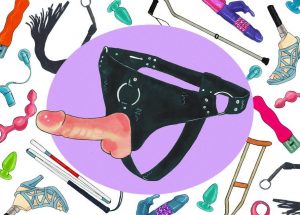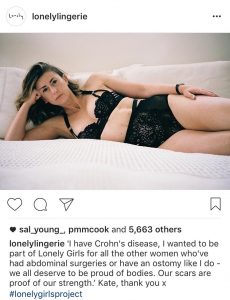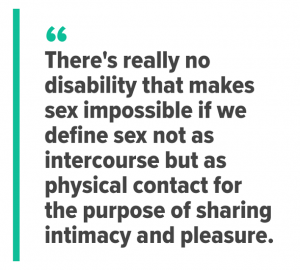I’ve written a bit about sex and disability before, but that was a long time ago and recently I’ve spoken with few people about their experiences, so I want to talk about it more.

image by Pinky Fang
Disclaimer: people with disabilities from all walks of life can want, and have, sex! You’re all shocked, I know. Salacious af.
We also can struggle with it, just like anyone else. There are unique challenges, no matter what your disability or illness might be.
When I wrote about this before, it was a couple years ago and I was looking at how my relationship with my body had been affected by getting sick. That’s still something I’m working on – I always will be, because my body continues to change and I continue to be challenged by it. It can be very hard to feel sexy when your illness, and your medications, are creating a bunch of conditions that may not be ideal and that you can’t control.
I’m forging a new relationship with my body. I’ve realised that, as a woman in this society, I expect a lot from it. I expect it to function and perform on command. I expect it to keep going at all costs, even if I don’t provide it with the right fuel. I expect it to fit external measures of beauty, at all times.
The biggest thing I used to expect from it (beyond basic functioning, which we don’t even question until it stops) was that last bit. That it would be desirable to others. Now, the biggest thing I expect from it is that it will respond kindly when I give it what I think it needs. That it will not be in pain. That it will heal. That it will allow me to write, to interact, to keep participating in life.
My belief system about what is attractive and not attractive, sexy and not sexy, is informed by internal and external pressures. And to me, my sick and disabled body does not fit those pressures. This is absolutely not a comment on what is attractive for other people. People of all body types and abilities can be and are sexy and attractive and actually their sex lives are none of my business.
I’ve kind of made some people’s sex lives my business since I wrote that, or, more accurately, they’ve chosen to share with me.
One of those people is Kate Montgomery, who I wrote about for Folks. We spoke about her fight for her positive body image.
 Kate is currently part of a campaign for Lonely lingerie, something she found liberating and empowering after surgery that irrevocably changed her body.
Kate is currently part of a campaign for Lonely lingerie, something she found liberating and empowering after surgery that irrevocably changed her body.
“Getting an ostomy was like having my self-esteem squashed into thousands of tiny pieces, then put in an industrial strength blender, then run over with one of those machines they use to lay asphalt. I’ve worked really hard to put it, and myself, back together.”
“I thought no one would ever be attracted to me again,” Kate told me in her Folks interview. “I was ashamed of it, it just mortified me. I would cry just thinking about it.”
But, largely due to her hard work both rebuilding her strength in the gym, and working on body positivity for herself and others, Kate doesn’t feel like that anymore. She appreciates her body for the strength it has.
—
Craig*, who spoke to me on Twitter, said his loss of interest in sex due to primary headache syndrome had been the cause of the end of at least one relationship.
“It became a breaking point in a relationship last year. I did a pile of tests to see if my libido was something else — nope. testosterone fine, everything checked out. so, it’s (literally) all in my head.
Usually I shy away from diagnosis/labels, and just describe it as a constant dull headache (I reached 14 years last month, weee! best anniversary.) Add to the mix some chemotherapy in the midst of all of that, which arguably altered brain function. one way or another, I’m most of the way toward asexual when it comes to relationships on a practical level. it’s just easier to just…not.

